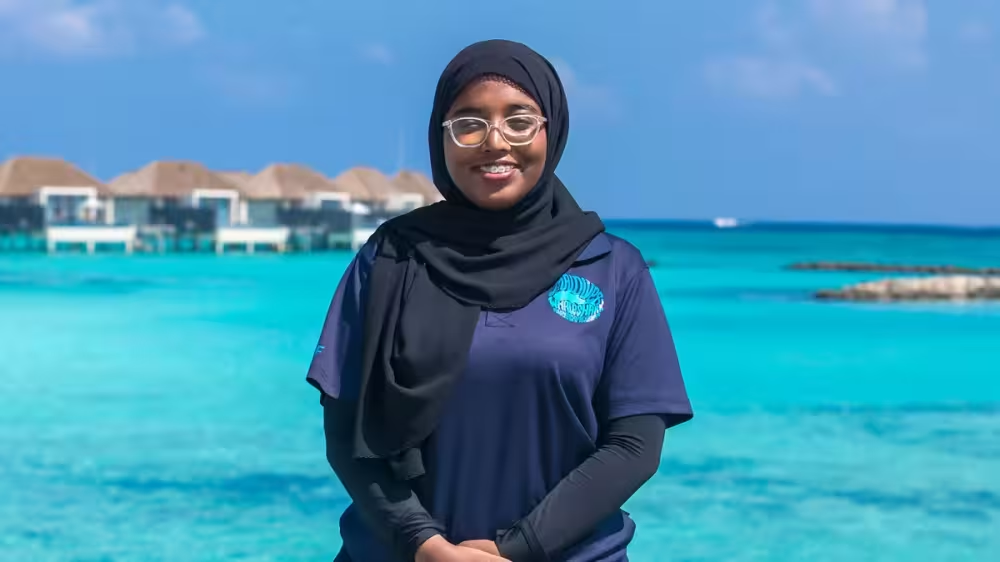Rafha’s passion for nature was sparked early, rooted in a childhood spent under the nurturing influence of her mother, a fervent lover of the natural world. Growing up in the Maldives, Rafha was surrounded by her mother’s vibrant garden, a fish pond teeming with life, and a menagerie of birds and rabbits. Together, they wandered beaches collecting shells, swam in crystalline waters, and explored the diverse plant life that dotted their paths. These moments instilled in Rafha a deep-seated joy in caring for living things, a foundation that would shape her future. Yet, it was the sight of trash—plastic bottles littering the shores and waters of her beloved beaches—that ignited a sense of urgency. By grade 8, a visit from Parley, an organization dedicated to ocean conservation, crystallized her desire to act. Though she didn’t yet know it would lead to a career in environmental biology, her role as president of her school’s environmental club hinted at the path ahead.
Her academic journey at Monash University in Malaysia, where she studied tropical environmental biology, was transformative. It equipped her with technical skills—analysis tools, report writing, and field experimentation—while exposing her to the vast possibilities within the field. From corporate roles to hands-on research, Rafha explored rainforests and met inspiring lecturers who helped her realize her preference for research over policy-driven work. A pivotal moment came during a project with Lang Tengah Turtle Watch, a Malaysian NGO focused on reducing turtle egg poaching. By interviewing community members, from elders to egg sellers, Rafha contributed to awareness campaigns that bridged conservation with local needs, steering her toward marine biology.
Her first internship at Zoo Negara Malaysia was a dream fulfilled. A childhood fascination with insects—once keeping ants as “pets” before releasing them—made working with them and amphibians thrilling. She learned about their critical roles in ecosystems, from nutrient recycling to habitat adaptations, and shared this knowledge with zoo visitors. These experiences, coupled with water-based university projects like studying oyster distribution in degraded versus pristine coastal areas, deepened her interest in marine ecosystems.
Returning to the Maldives after her degree was a natural choice. The islands’ rich marine biodiversity and the environmental challenges she witnessed growing up—like litter threatening marine life—drove her to contribute to her homeland’s conservation efforts. At the Maldives Underwater Initiative, Rafha dove into coral restoration, an experience marked by a magical night dive during a coral spawning event. Waiting in the cold, dark water with only flashlights, she watched as corals released eggs and sperm in perfect synchrony, floating upward like stars. This breathtaking moment underscored the beauty and fragility of marine life.
Her work at the Atoll Marine Center further expanded her expertise. There, she engaged in sea turtle rescue and rehabilitation, coral gardening, and sustainability initiatives. She monitored turtle nests, collected Photo ID data, and collaborated with organizations like the Olive Ridley Project to bolster conservation. Beyond marine life, she led nature walks highlighting Maldivian flora like breadfruit and coconut palms, advocating for the use of local resources such as Indian almonds and screw pine fruits in resort operations. Her monitoring of white-tailed tropic bird nesting populations marked a pioneering study in the Maldives, shedding light on an understudied seabird species and sharing these findings with resort guests.
Now, as an intern at the Maldives Whale Shark Research Program at Radisson Blu in South Ari Atoll, Rafha is immersed in studying one of the ocean’s gentle giants. South Ari’s year-round whale shark sightings and high re-sighting rates make it a global hotspot. Through Photo ID research, Rafha helps maintain a database of over 830 individual whale sharks, each identified by unique spot patterns akin to fingerprints. The fact that none of these sharks have been re-sighted elsewhere underscores the Maldives’ critical role as a habitat, making her work vital for global conservation. Beyond research, she educates guests about whale sharks and the threats they face, fostering awareness in a region where these creatures are both a treasure and a responsibility.
Rafha’s journey—from a child collecting shells to a researcher protecting whale sharks—reflects a lifelong commitment to preserving the Maldives’ marine ecosystems. Each step, from academic exploration to hands-on conservation, has been driven by a blend of curiosity, urgency, and a deep love for the natural world that surrounds her home.



